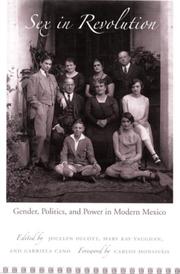| Listing 1 - 6 of 6 |
Sort by
|

ISBN: 0822336537 0822336650 9780822336655 0822387352 Year: 2007 Publisher: Durham, N.C. Duke University Press
Abstract | Keywords | Export | Availability | Bookmark
 Loading...
Loading...Choose an application
- Reference Manager
- EndNote
- RefWorks (Direct export to RefWorks)
Women revolutionaries --- Women political activists --- Political participation --- Feminism --- Femmes révolutionnaires --- Femmes activistes --- Participation politique --- Féminisme --- History --- Histoire --- Mexico --- Mexique --- Politics and government --- Participation, Female. --- Politique et gouvernement --- Participation des femmes --- Sociology of the family. Sociology of sexuality --- anno 1900-1999
Book
ISBN: 0190649984 0195327683 0197574742 0199344833 0199716641 Year: 2017 Publisher: New York, NY : Oxford University Press,
Abstract | Keywords | Export | Availability | Bookmark
 Loading...
Loading...Choose an application
- Reference Manager
- EndNote
- RefWorks (Direct export to RefWorks)
In June 1975, thousands of people converged on Mexico City for the United Nations (UN) conference celebrating International Women's Year (IWY), the first of four UN women's conferences that would eventually include those in Copenhagen (1980), Nairobi (1985), and Beijing (1995). Scholars and activists regard IWY as a watershed moment in transnational second wave feminism. Billed as the 'greatest consciousness-raising event in history,' the IWY events included both an official conference, which offered an unprecedented opportunity to put women at the center of international policymaking, and a parallel nongovernmental organization (NGO) tribune, which launched a new generation of civil society organizations focused on issues related to women and gender. This work examines the history, the actions and legacies of the IWY conference.
International Women's Year, 1975. --- Women's rights --- Feminism --- Women --- History --- International cooperation
Book
ISBN: 1478010061 1478011114 1478012641 Year: 2020 Publisher: Duke University Press
Abstract | Keywords | Export | Availability | Bookmark
 Loading...
Loading...Choose an application
- Reference Manager
- EndNote
- RefWorks (Direct export to RefWorks)

ISBN: 0822338998 9780822338994 082233884X 0822388448 Year: 2006 Publisher: Durham, N.C. Duke University Press
Abstract | Keywords | Export | Availability | Bookmark
 Loading...
Loading...Choose an application
- Reference Manager
- EndNote
- RefWorks (Direct export to RefWorks)
Sex in Revolution challenges the prevailing narratives of the Mexican Revolution and postrevolutionary state formation by placing women at center stage. Bringing to bear decades of feminist scholarship and cultural approaches to Mexican history, the essays in this book demonstrate how women seized opportunities created by modernization efforts and revolutionary upheaval to challenge conventions of sexuality, work, family life, religious practices, and civil rights. Concentrating on episodes and phenomena that occurred between 1915 and 1950, the contributors deftly render experiences ranging from those of a transgendered Zapatista soldier to upright damas católicas and Mexico City’s chicas modernas pilloried by the press and male students. Women refashioned their lives by seeking relief from bad marriages through divorce courts and preparing for new employment opportunities through vocational education. Activists ranging from Catholics to Communists mobilized for political and social rights. Although forced to compromise in the face of fierce opposition, these women made an indelible imprint on postrevolutionary society. These essays illuminate emerging practices of femininity and masculinity, stressing the formation of subjectivity through civil-society mobilizations, spectatorship and entertainment, and locales such as workplaces, schools, churches, and homes. The volume’s epilogue examines how second-wave feminism catalyzed this revolutionary legacy, sparking widespread, more radically egalitarian rural women’s organizing in the wake of late-twentieth-century democratization campaigns. The conclusion considers the Mexican experience alongside those of other postrevolutionary societies, offering a critical comparative perspective.
History --- Teaching --- Sociology of work --- Social change --- Politics --- Community organization --- Sociology of the family. Sociology of sexuality --- anno 1900-1999 --- Mexico --- Gender --- Labour --- Education --- Revolutions --- Women's movements --- Book
Book

ISBN: 9781400849895 Year: 2013 Publisher: Princeton, NJ
Abstract | Keywords | Export | Availability | Bookmark
 Loading...
Loading...Choose an application
- Reference Manager
- EndNote
- RefWorks (Direct export to RefWorks)
Digital

ISBN: 9781400849895 9780691159096 Year: 2013 Publisher: Princeton, N.J. Princeton University Press
Abstract | Keywords | Export | Availability | Bookmark
 Loading...
Loading...Choose an application
- Reference Manager
- EndNote
- RefWorks (Direct export to RefWorks)
| Listing 1 - 6 of 6 |
Sort by
|

 Search
Search Feedback
Feedback About UniCat
About UniCat  Help
Help News
News